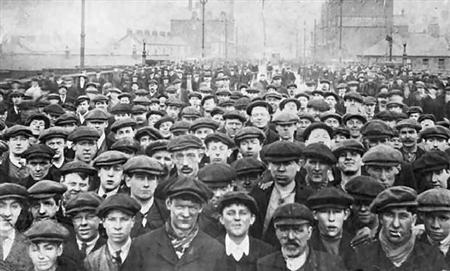
I’m not talking about the individuals managing their part of the business (although I might be), and I’m not talking about the department heads overseeing the operation of their part of the organization (although I might be) — I’m talking about the relative rights of Employers and Employees and, more specifically, the question of why employers have any rights at all.
This story is very interesting in many ways, but the most interesting part is not the headline maker, it’s the assumption that when you take a job, you automatically lose some of your individual rights:
A Christian registrar who was harassed and discriminated against after she refused to carry out same-sex civil partnership ceremonies has won a key legal battle. Lillian Ladele, 47, said that she was treated like a pariah by colleagues at Islington council in North London after she said that she could not carry out the ceremonies as a matter of religious conscience.
An employment tribunal found that the council showed no respect for Ms Ladele’s rights “by virtue of her orthodox Christian beliefsâ€.
Employment lawyers said that while the case set no binding legal precedent, it would make councils much more likely to give weight to the religious views of employees. The decision outraged gay rights campaigners, who said that it “sanctions the right of religious people to discriminateâ€.
Suspend, for a moment, your views of gay partnerships and religious belief, and consider what this story is actually saying: essentially, when this person took on her job she was expected to shed some of her rights in order to sustain her employment. It wasn’t such a problem for her at first, but conflict was bound to emerge when conducting civil partnerships became part of her role. She was asked to carry out what the council considered to be part of her normal duties, despite her moral objections.
Suppose you are working for a bank, and that bank decides to sell a new type of investment concentrating on clear-felled timber; or perhaps tar sands; or maybe arms companies that sell their wares to repressive regimes. You ask for the right not to sell these offerings because you feel morally opposed to them. You are sacked for not carrying out your normal job.
See, it’s not a gay or religious rights issue at all.
The rights of an employee should always trump the rights of the employer unless there are very special circumstances — for instance, if an airline pilot suddenly decides he or she doesn’t want to fly for environmental reasons, then it would be impossible for them to continue being an airline pilot (way to go, former airline pilot!) — but these circumstances are few and far between. I guess we have all, in our working lives (those of us who have worked for someone) been asked to carry out a task that we felt uncomfortable with and didn’t seem to fit within our job description; it probably came under that magic phrase, “and anything else your manager requires you to do.”
The crunch really comes, though, when the rights of an employee threaten the financial situation of a company, or an authority, or a nation. An employer, regardless of who it purports to represent, is not an individual. However, Corporations, through the laws of incorporation, have the same rights as individuals but, through something called “limited liability”, they are not subject to the same restriction on activity as individuals — the liability is spread amongst every single shareholder and so the pain is diluted.
You can stop an individual with a single bullet. A corporation has thousands, millions of hearts, yet no soul.
The acts of incorporation is designed to support economic growth above the rights of the billions of people who will ultimately suffer because of the failed economic experiment that is starting to go into meltdown. Authorities and public services, are increasingly motivated by money and are going the way of the corporation — laws exist to protect the “rights” of the “public” body over any attempt to thwart its commercial activities. The case of the Christian registrar probably went her way because she was not actually an economic threat to the system: had an employer objected to the way that authorities operate in order to maximise commercial gain, they would not have had a leg to stand on. This is the way it is in civilization: this is the way it has to be.
You have “rights” for sure. All the rights in the world…unless you threaten the great commercial machine we all work for.